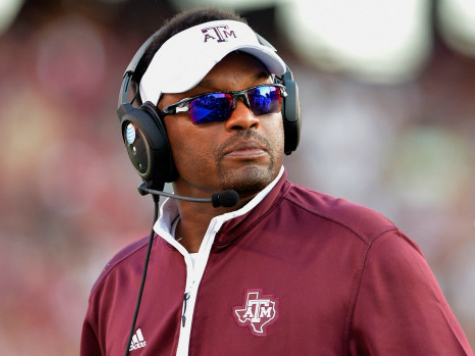A century and eight years before the Aggies of Texas named Kevin Sumlin head coach, the Aggies of Massachusetts named Matthew Bullock the first black head coach of a college football program at a non-historically black college. Though integrated on the field from its earliest days, football has seen its sidelines overwhelmingly patrolled by white men.
The current college football season opened up with a total of 11 Division 1 African American head coaches. Most prominent among them are media-darling/aspiring rock-star Sumlin of of Texas A&M, media-weary/old-school Charlie Strong of Texas, and Stanford’s David Shaw, a stoic sideline stalwart. Sumlin and Strong sit atop college football’s mecca, Texas, the most fertile high school recruiting ground in the country, while Shaw coaches in California, which is the nation’s third most bountiful producer of college football recruits.
Shaw inherited the top job at Stanford when Jim Harbaugh left to lead the NFL’s San Francisco 49ers in 2010. He has two Pac-12 championships and three BCS bowl games under his belt as Cardinal front man.
Charlie Strong got his head coaching start at the University of Louisville in 2009 after 24 years as a position coach and coordinator. He led the Cardinals to a 37-15 record and two conference titles, going 3-4 in bowl games.
The University of Texas installed Strong on January 5, 2014. When asked whether he understands the significance of being the first black head football coach at Texas and whether it means something to people around the country, Strong replied: “It does. Not only in this great state, but all across the country…. Floyd Keith used to be the director of the Black Coaches Association. He said to me then, he said: ‘What you need to think about is the African-American coaches that you’re representing right now [who] did not get the chances that you’re getting.'”
Sumlin has a record of 21-5 at Texas A&M, including two bowl wins. He is the first black head coach to produce a Heisman Trophy winner in former A&M quarterback Johnny Manziel.
According to the latest census, African Americans represent 13% of the US population, which would put black college football coaches just below what would be in sync with the national population. However, the latest NCAA Student-Athlete Ethnicity Report found that 45.8% of players in the FBS conferences are black. These numbers suggest that African Americans play the game in great numbers, but are underrepresented when it comes to coaching it.
Some of this can be attributed to the quality of jobs that black coaches receive. “Research suggests the overall winning percentages of black football coaches tend to suffer because the majority of black football coaches take over programs that require a major rebuilding process,” says Dr. Fitz Hill, president of Arkansas Baptist College and author of Crackback! How College Football Blindsides the Hopes of Black Coaches. “In turn, these low winning percentages of black coaches negatively influence the perception of their coaching abilities.”
Surrounded with vast talent and deep coffers, Sumlin, Strong, and Shaw are soundly positioned to blaze a trail for black coaches seeking jobs in the future. None is in charge of a major rebuild and each is exceptionally well funded. Sumlin and Shaw benefit from new conference TV contracts, while Strong has the advantage of the Longhorn Network. As far as college football is concerned, Texas has unlimited funding, while Texas A&M and Stanford want for nothing.
The contrast in styles proves that there is no prototypical successful black coach–just as there is no prototypical coach. As black coaches in college football continue to land jobs at top programs, the hope is that soon this topic won’t be worth discussing. The success of black coaches at major college football programs, especially those as well equipped as Sumlin, Strong, and Shaw should mitigate hesitation to hire future waves of worthy minority candidates.

COMMENTS
Please let us know if you're having issues with commenting.